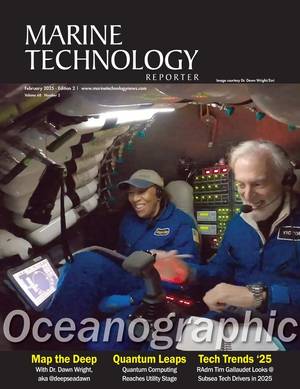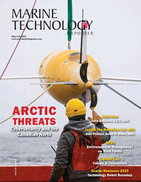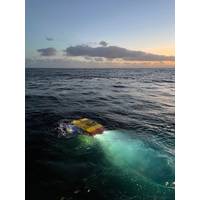
NOC Expedition Seeks Answers on Subsea Mining Impacts
. SMARTEX is funded by the Natural Environment Research Council (NERC) and its project partners. Natural History Museum, British Geological Survey, Heriot Watt University, JNCC, (Joint Nature Conservation Committee), Liverpool University, SAMS (Scottish Association of Marine Science), University of Plymouth, University of Southampton.Image courtesy NO
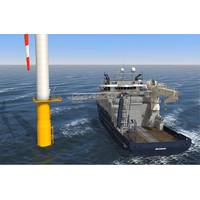
Plymouth University, Kongsberg Digital Partner to 'Revolutionize' Floating Offshore Wind Ops
The University of Plymouth and Kongsberg Digital, a provider of software solutions to maritime, oil and gas, renewables, and utility sectors, have partnered up to create a new system they say could revolutionize the UK’s floating offshore wind sector."By combining cutting-edge simulator technology to provide a synthetic offshore wind environment in real-time and the university’s R&D expertise, the partnership aims to provide offshore wind project teams and crew with facilities to verify, test and optimize installation and maintenance projects," Kongsberg Digital said Tuesday.
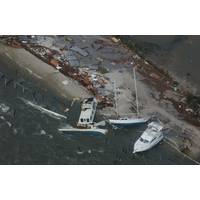
Abandoned Fiberglas Boats are Harming the Marine Environment
, scientists have investigated the damage to mangrove, seagrass and coral habitats and although the effects have only been recorded on a relatively localised basis for now, the cumulative effect of abandoned boats may increase exponentially in the coming years.To take one example, researchers from Plymouth University found high concentrations of copper, zinc and lead in sediment samples and inside the guts of ragworms in two estuaries in eastern England (Orwell and Blackwater). These contaminants greatly exceeded the environmental quality guidelines, and came from peeling paints from boats abandoned nearby
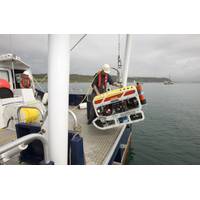
Marine Robots Take Center Stage
could help accelerate new business ideas to market.” Speakers for the event include market-leading companies such as Ørsted (previously Dong Energy (UK)), Cornwall-based TouchByte and Autonomous Systems developer SEICHE, as well as experts from the University of Exeter and Plymouth University. ORE Catapult will discuss the challenges involved and Innovate UK will talk about national funding opportunities. There will also be interactive exhibits and innovative technologies on display. Attendance at the event is free, and delegates can register here: https://www.eventbrite
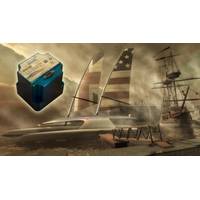
Silicon Sensing Supports Mayflower Autonomous Ship Project
with 102 intrepid early settlers bound for the new land across the Atlantic Ocean, a perilous journey which took 66 days to reach what we now know as Cape Cod, Mass. To mark the 400th anniversary of this undertaking, a team led by U.S.-owned but Plymouth-based firm MSubs, and including Plymouth University and charitable research foundation ProMare, has initiated a plan to design and build a fully autonomous ship to make the same Atlantic crossing, completely unmanned, in 2020. During the voyage, the Mayflower Autonomous Ship – MAS400 – will conduct a series of scientific experiments
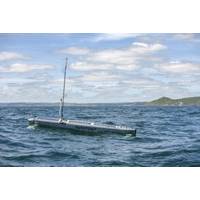
Autonomous Boat Deployed to Monitor Ocean Noise
A new project in Plymouth aims to find out how increasing levels of manmade noise in the sea is affecting marine life. Plymouth University Marine Institute scientists are working with AutoNaut and its 5m unique wave-propelled unmanned surface vessel (USV), which tows a Seiche Ltd passive acoustic monitoring (PAM) array. This technology enables the gathering of essential underwater sound data that is both high quality and cost-effective. Dr. Clare Embling and Dr. Simon Ingram, both lecturers within the School of Marine Science and Engineering and experts in marine mammal
Outdated Systems Placing Vessels at Risk of Cyber-Attack
because many are carrying outdated software and were not designed with cyber security in mind, according to new research. But operators could easily mitigate against such dangers by updating security systems, improving ship design and providing better training for crews, the study led by Plymouth University’s Maritime Cyber Threats Research Group suggests. Traditionally, attacks on marine vessels have included piracy, boarding, theft, and/or destruction, and while these attacks have often been successful and continue, they are well understood. In contrast, the article
Project Mars: The future of Autonomy
. As autonomous systems are continually proven a success in the field, the spotlight has now turned to the maritime sector. World-first ventures are emerging with aspirations of proving the potential of autonomy and its ability to transform the future of ocean voyages. A new collaboration between Plymouth University and MSubs, has set a course to build the first fully autonomous state-of-the-art ocean research vessel that will demonstrate the possibilities of autonomy within the shipping industry. The potential of autonomous vehicle technology to address the challenges of working in conditions that
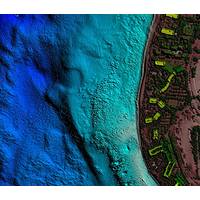
Coastal Mapping Tech in Focus at Shallow Survey
Teledyne Optech said it will attend the Shallow Survey 2015 conference September 14-18 at Plymouth University in England, where a current user of the Optech CZMIL Coastal Zone Mapping and Imaging Lidar will make a presentation comparing various lidar bathymeters. With the conference focusing on high-resolution surveys in shallow waters, Teledyne Optech said it expects CZMIL Nova to draw attention for its ability to detect objects as small as one cubic meter in water up to 25 meters deep. CZMIL Nova has also expanded the list of coastlines that can be surveyed with lidar, thanks to advanced
 February 2025
February 2025
